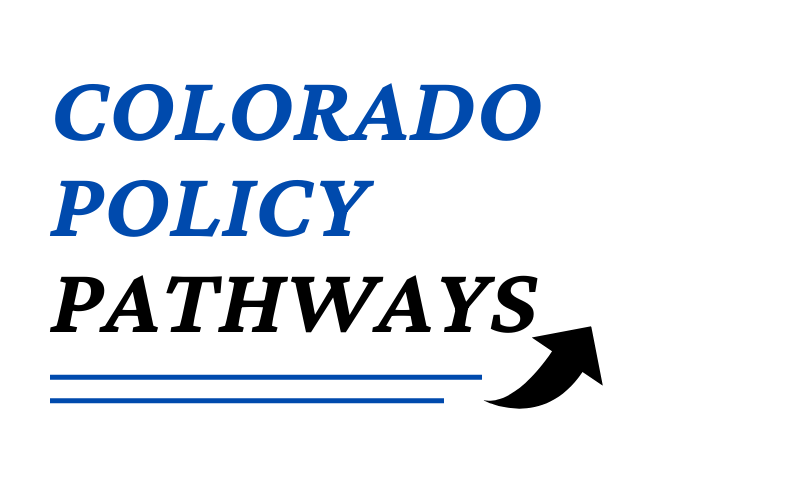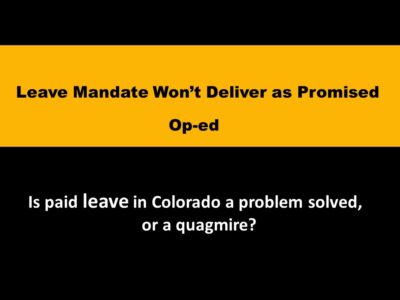Originally published in Colorado Politics Mar 10, 2021
Another legislative session is already well underway at the Capitol in Denver, yet what is missing is noticeable. Unwelcome has been a serious discussion of one of the most consequential laws to date for Colorado’s workers, businesses and economy. Paid family and medical leave, passed in November, quietly awaits the lengthy implementation process. It should instead be a prominent backdrop for this session. It represents looming uncertainty for the economy.
The measure was premature at best. It was boldly crafted with terms that go too far. It will be a disappointment and a setback for workers, many of whom are now expecting it will deliver only benefits and relief.
The spreading impacts of this approach to provide paid leave are being more widely recognized. Doubt is growing that earlier experiments in Western Europe and the few early states like California, New Jersey, and Rhode Island have been broad successes. All of these are struggling with poor outcomes. They face the painful predicament that, once granted, these benefits and the vast infrastructures that support them are inescapable and hard to adapt.
Presumably, the goal is upward mobility. Yet a program that does not reach lower-income and lower-skilled workers equitably, that raises the cost of living at the same time it depletes take-home pay, and that slows job opportunities that might encourage career and wage growth, is not a winning formula for upward mobility. It is instead a vehicle for declining productivity. It repels business investment and entrepreneurship. But most disappointing, it builds barriers to ongoing efforts to update managerial and organizational practices. These are critical to bringing mutual benefit to workers and consumers in rapidly changing environments.
Finally, it erodes business diversity. It forces a poorly suited policy on small independent firms. They are already squeezed by growing competition and burdensome regulations from all layers of government. Together, these drain their productivity and precious resources, leaving their viability exposed.
Endorsement of Prop 118 by nearly all of Colorado’s Democratic state-level officeholders sent a strong message to voters that the measure is trustworthy. It also demonstrated a disinterest in the plight of small businesses vulnerable to its nearly unprecedented job protection requirement for employees on leave. Prop 118 imposes it on firms with as few as one employee despite how little is understood of potential outcomes. Compliance could be an unsustainable hardship.
We all recognize the urgent need to facilitate the participation of working caregivers. But confidence in this expansive policy model as a solution is unearned. Proponents have relied on theories and simulation models that, however sophisticated, are devoid of the many costs and risks, direct and indirect, that impact decision making as the policy tangles with a business environment. Those variables are missing because they are extremely hard to track and measure and vary widely among types of businesses. But also because proponents have downplayed these concerns and dodged efforts by the vast, diverse business community that has earnestly tried to share them.
Businesses succeed and fail in environments that are typically full of market uncertainty. That will never change. It must not change. Stagnant economies are stable — but not in a good way. Advocates believe that government and regulatory solutions like paid leave will eliminate uncertainty for workers from these environments. They will not. They will succeed only in displacing it.
The tragedy is that in workplaces and forums large and small across the economy, energy and resolve were building to address caregivers’ conflicts. In these many unique contexts, those efforts will likely retreat and move on. This grand, sweeping program sends a message that the problems are solved. But businesses know that it is not that simple. Decision making has already begun to evolve in anticipation of challenges.
Meanwhile, the outlook for job creators grows ever more unclear. Recent and proposed government measures further threaten the balance between workers and businesses. These promote distrust and encourage litigation. Resulting compliance is complex, expensive, and for many, overwhelming. It detracts from businesses’ primary mission — serving customers, supporting their staff and workforce, and being here another day.
Whether or not Colorado’s economy can rise above the new paid leave program’s challenges is unknown. But a lagging recovery will likely be influenced by a business community that understands the outstanding risks from government policies that are building an environment hostile to employers and that discourage hiring.
Diana Petrak is the founder of Colorado Policy Pathways. She served as a member of the 2019 Colorado Family and Medical Leave Insurance Task Force.



 We need to stop looking for the answer.
We need to stop looking for the answer.